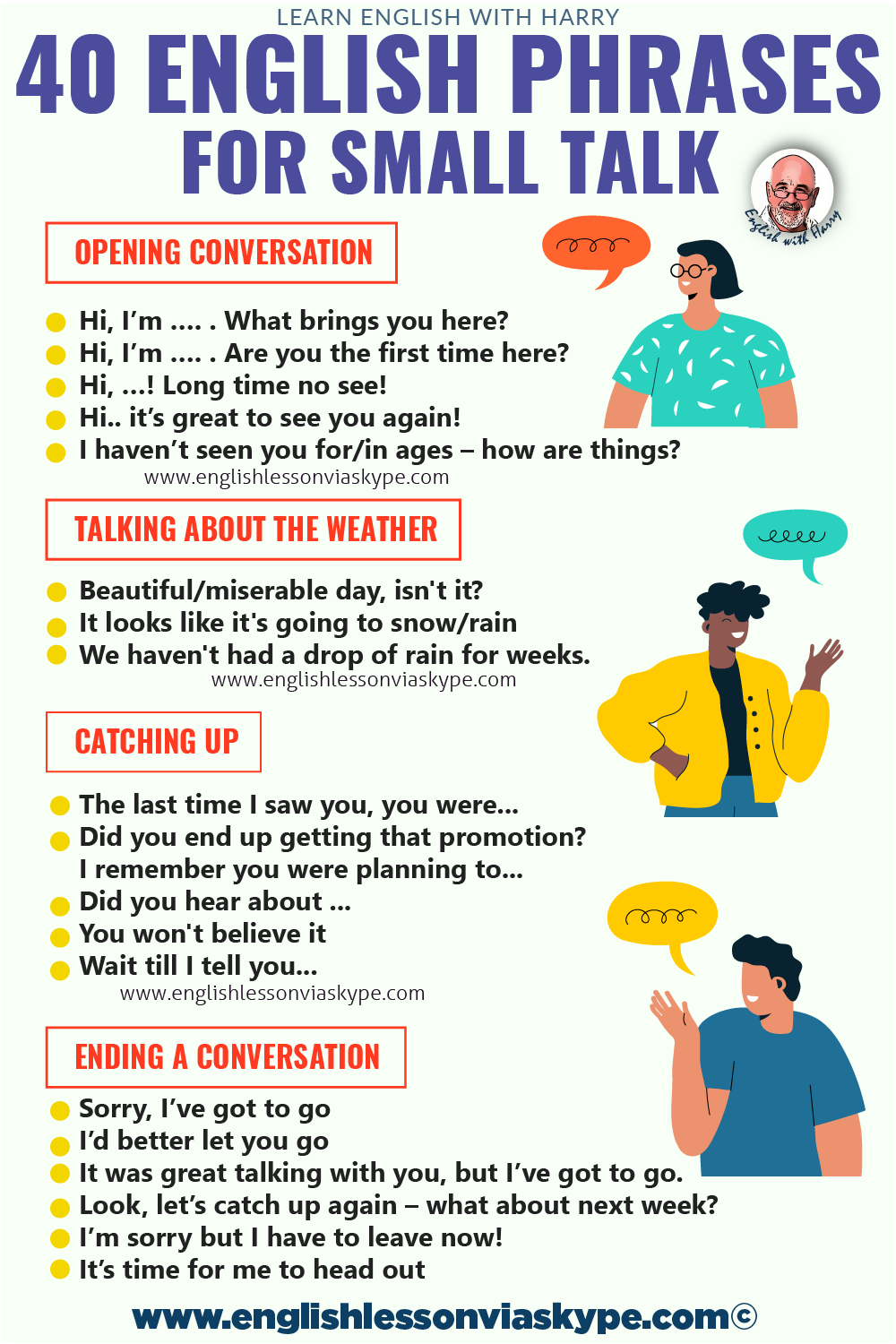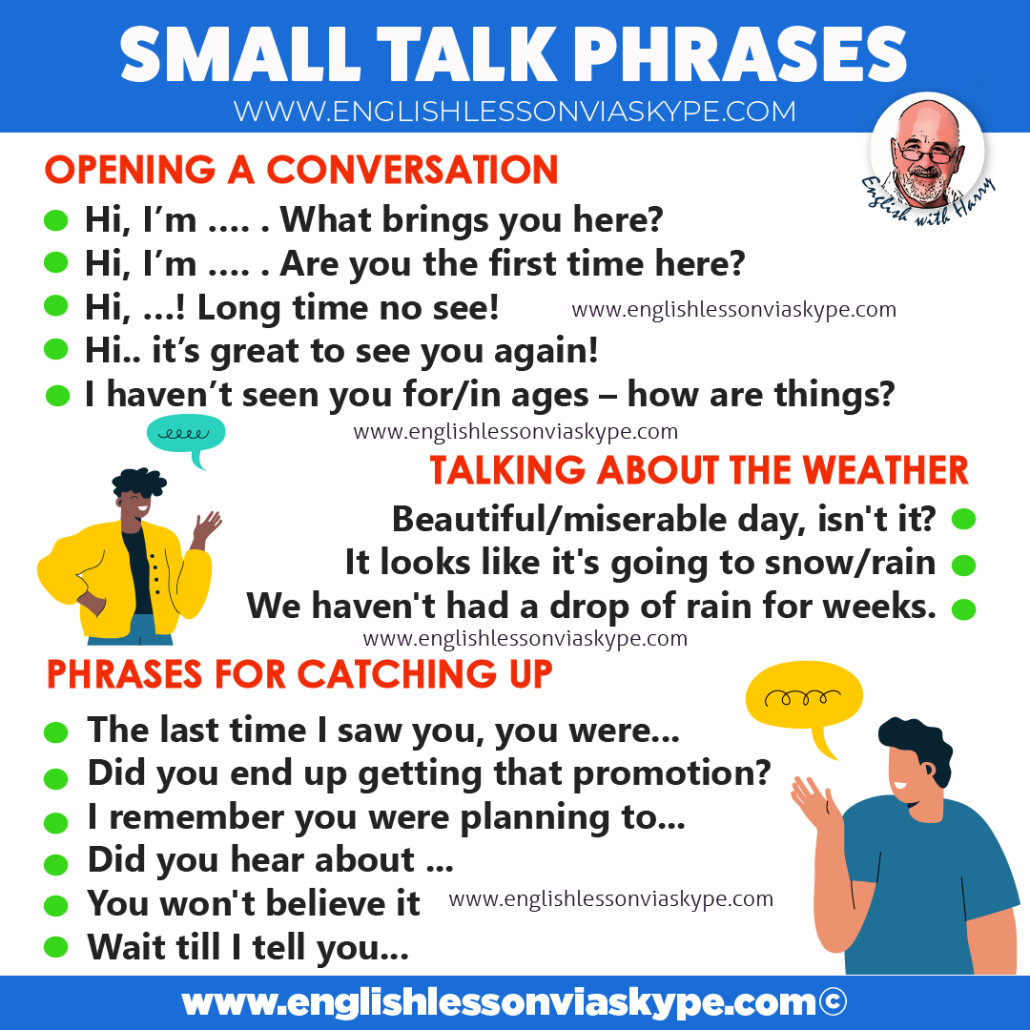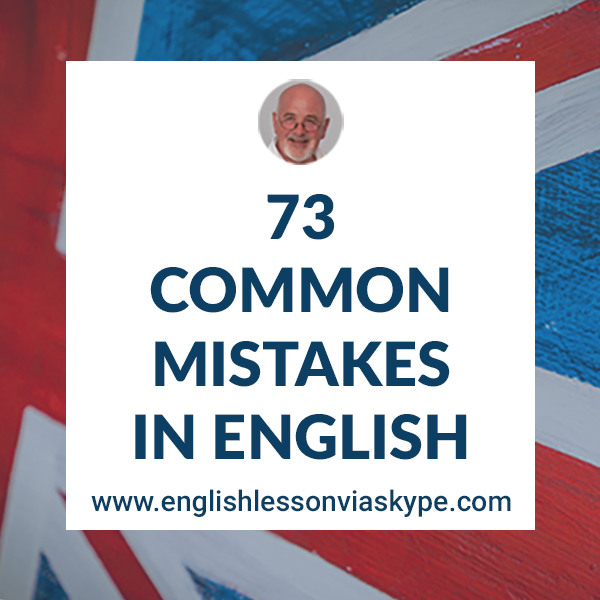How to make small talk in English? Small talk is a very important part of the English language. It’s the beginning of many English conversations when people are in lifts, before and at the end of business meetings.
If you want to become fluent in English, you need to know how to master small talk. These English phrases for small talk will help you.
Listen to the podcast Speak Better English with Harry or watch it on YouTube at Learn English with Harry.
Harry
small talk phrases in English
How to make small talk in English
Many, many of the students who come to me want to understand small talk in English.
✅ How to begin a conversation.
✅ How to end the conversation.
They usually know, and I’m sure you’re the same, you usually know the technical language you want to use if you have a conference call or an online meeting in English. But you might feel a little bit insecure, or a little bit embarrassed, or shy about entering the conversation at the beginning or the end using small talk.
This lesson is going to help you develop your small talk in English skills.
give a gift of learning Offer up to 50% off
Great way to improve your English. Use code SPRING23

give a gift of learning Offer up to 50% off
Great way to improve your English. Use code SPRING23

small talk phrases for opening conversation
So the first small talk is about the opening conversation. So when you’re meeting somebody in the elevator, or as I said, or the beginning of a presentation, and nowadays at the beginning of a Zoom call, perhaps while you’re waiting for the boss or whoever has organised the meeting. While you’re waiting for them to join, there may be a little bit of small talk. So what sort of opening conversations can you have? Let me give you a few.
Hi, I’m Harry, what brings you here?
So if you’re meeting in a bar, or you’re meeting in a conference room, it’s a very informal way of asking the person, why are they coming to this particular conference.
Hi, I’m Harry, is this your first time here?
is another way of getting the conversation started because then you’re asking the person this is the first time they’ve been to this college event. Is this the first time they’ve been to these lectures? Is this the first time they’ve been to this sports hall, or gym or yoga session?
Or you can even ask the person
Hi, I’m Harry, what are you here for?
Meaning and so what’s your reason for being here?
book your trial English Lesson
Or if we’re meeting somebody that we haven’t seen for a period of time, then the best way to start the small talk with them is
Hi, Michael. Wow, long time no see.
Meaning it’s been a long, long time since we met.
Now, it could be weeks. It could be months. Even could be years. There’s no definition of what that time should be.
Hi, Pete. It’s great to see you again.
I haven’t seen you for/in ages.
You can use either of those prepositions.
How are things?
Meaning? how was your life? How are things been? How’s your business? How’s your family? Just generally, how are things? So really, really informal.
Okay, so they’re the opening conversations.
How to make small talk in English

Share and help other students to improve English language skills.
talking about the weather
Now, as always, particularly if you’re talking to people in the UK and here in Ireland, the weather is a really important part of small talk.
You need to have conversational expressions that you can use if the weather comes up. So here are a few.
Oh, beautiful day, isn’t it?
You’re just talking about the weather, you’re looking at the window.
Or if it’s not such a beautiful day, you might say.
Well, miserable day, isn’t it? It’s really so wet. I hadn’t seen rain like this in a long time.
Oh, miserable day. Typical. Typical of the UK. Typical of London.
It looks like it’s going to snow.
It looks like it’s going to rain.
So again, you’re putting forward a suggestion of what you think, based on your experience.
It wouldn’t surprise me if it snows/rains.
It’d be great if it rains, we haven’t had a drop of rain in weeks.
If you’re lucky enough to have a hot, dry summer, it’d be great to have some rain.
So very typical sentences, expressions that you can use that will get you into those conversations, particularly when they’re talking about the weather.
How to make small talk in English

How to make small talk in English
small talk phrases for catching up
When we’re talking small talk, a lot of the conversation is about catching up with people. So what sort of expressions or phrases can you use when you’re catching up with people in English?
The last time I saw you, you were ….
- changing your job
- expecting a baby
- going to write a book
Did you end up getting that promotion?
Did you end up getting that new job that you’d applied for?
Did you end up doing that travelling that you had promised yourself?
I remember you were planning to go on a world cruise.
So again, leading you into certain questions about the activities they may or may have been about to do the last time that you met them.
Did you hear about the business?
Did you hear about the guys we went to college with?
Did you hear about Mrs. Murphy who used to live around the corner from us?
Again, introducing the topic that will get your colleague or the person you’re talking to continue the conversation.
You won’t believe it when I tell you what has happened to me.
You won’t believe it when you hear the story about our ex-boss. Do you remember that guy?
Wait till I tell you…
So these are good ways to catch up, introduce you to them as to what’s happened to you. And then you ask them, what has happened to them.
How to make small talk in English
asking about work, studies, etc
The next few little sentences are about where you want to ask somebody specifically about their business, their work, or about the studies.
Are you still working for the company in the high street?
Are you still working for an IT company?
Are you still working in the local hospital?
So how are your studies going? You must be almost finished your studies by now. What year are you in?
Or just generally:
So how’s work going?
What’s the work like these days?
How do you like working remotely?
So if you want to bring it right up to modern times, and that’s a very popular topic and will be a popular topic for some time now about the difference between working in the offices or working remotely.
What do you think about working remotely? How’s it going for you? Do you like it? Do you not like it?
improve english on a budget
Online English Courses from €7.99
How to make small talk in English
making comments about their look
And if you want to be very nice to people, or speak nicely about people, then you might make comments about how they look. If that happens to be the person you’re talking to, then you might be very complimentary, of course, about how they’ve changed.
Oh, I like your new hairstyle.
Oh, you’ve really lost weight. That workout in the gym has really worked wonders.
You introduce nice topics that make that person feel good. They smile, and therefore the conversation will continue in a happy mood.
I really love those shoes. Where did you get them? Wow, I’d love a pair like that myself.
You look great.
Very simple. You don’t have to make any comment about anything else.
Oh, you’ve got glasses. They really suit you. Yeah, they’re really stylish.
So again, comments on their appearance, comments on their look, what they are wearing, what they’ve done to themselves. All complementary, of course. Nothing, that’s negative, and the conversation will continue.
The danger with small talk is you say something that somebody wasn’t expecting, and the conversation will stop there. And people will be looking at each other a little bit embarrassed. So you want to be complementary and open to allow the conversation to continue.
speak better English with Harry - Episode 326
closing off your conversation
When all of the business is done for the day, the meetings are over, the conference has ended, then we’ve got small talk to do with closing conversations. So here are some conversational pieces for closing conversations.
Oh, look, sorry, I’ve really got to go but give me a number. Let’s catch up.
Or
I’ve really got to go, give me your email and I’ll drop your a line.
I better let you go. I’ve taken up so much of your time. I’m sure you want to get home to the wife and kids.
Well, it was really great talking to you. We must catch up again soon.
Yeah, it’s really it’s really been wonderful. It’s been amazing. I haven’t seen you for such a long time.
It’s great to get all of the news. Let’s catch up again soon. Let’s do it again soon. Let’s not wait until the next meeting.
So give me a shout. We’ll get together for coffee or we’ll get the family together.
Look, I’m really sorry, but I have to leave now. Is that okay? I’ll talk to you later.
Okay, it’s time for me to head out. I am going to catch a train. Can I give you a lift?
It’s time for me to head out. Do you want to share a taxi?
So again, nice, soft, easy, comfortable ways of ending conversation so that you can leave and make sure that the contact or the communication is going to continue. So the next time you meet them, there are no embarrassing gaps.
Well, hopefully, those phrases will help you learn how to make small talk in English.
If there’s anything else that you’d like to have some help with, then drop me a line.
If you want to contact me, you can do so on www.englishlessonviaskype.com. Very happy to hear from you. Very happy to see what you are doing and what you want me to do for you.
Thanks for listening. Cheers.
More information
For more information on English grammar rules, English collocations and English idioms, check out the links below:
English travelling collocations
You can always study English advanced level at Learning English with the BBC.
You will love these English lessons

Ways To Say Thank You In English
Learn alternative ways to say thank you in English. Discover 12 unique phrases that will help you speak natural English


Crucial Communication Verbs In English
Learn crucial communication verbs in English. These verbs are especially useful in business and professional situations. You’ll learn powerful collocations or word combinations to use these 10 advanced English verbs.


English Collocations Related To Achievements
Learn English collocations related to achievements—a topic that often comes up in IELTS and other English proficiency exams. Learn how


